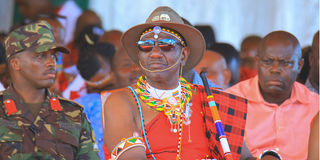Premium
New sub-county for Ilchamus in Baringo – Ruto

President William Ruto in Samburu on November 8, 2024.
What you need to know:
- President Ruto said the creation of a sub-county for the Ilchamus would address their limited access to government services and advance their aspirations for full constituency recognition.
- Local leaders and community members have welcomed the announcement, seeing it as an important step towards achieving their goal of independent representation in the National Assembly.
The government has announced the creation of a new sub-county in Baringo for the Ilchamus community, a marginalised Maa minority, to improve their representation and access to services.
The decision was announced by President William Ruto at the weekend during the Maa Cultural Festival in Samburu, where he acknowledged the longstanding challenges faced by the Ilchamus.
President Ruto said the creation of a sub-county for the Ilchamus would address their limited access to government services and advance their aspirations for full constituency recognition.
"I want to announce that we have created a new sub-county for the Ilchamus community. You will see this establishment in the Kenya Gazette Notice this coming Friday," he said.
The Ilchamus, as part of the larger Maa community, have expressed concerns about marginalisation, particularly in terms of political representation and administrative autonomy within Baringo County.
According to the Kenya National Bureau of Statistics, 32,949 Ilchamus/Njemps were recorded in the 2019 census.
Local leaders and community members have welcomed the announcement, seeing it as an important step towards achieving their goal of independent representation in the National Assembly.
"We will move forward together. The creation of the Ilchamus Sub-County shows that everyone will feel appreciated in this country," President Ruto added, reiterating his administration's commitment to supporting minority groups.

President William Ruto in Samburu on November 8, 2024.
The president also assured the Ilchamus community that his government intends to create a new constituency for them once the Independent Electoral and Boundaries Commission (IEBC) is reconstituted and ready to review boundaries.
“Once the IEBC is constituted, we will work towards creating a constituency that will truly represent and serve the interests of the Ilchamus community. But for now, they will have a new sub-county,” he said.
Currently, the Ilchamus are part of larger constituencies in Baringo County, where they are often politically overshadowed by neighbouring communities.
The creation of a separate constituency would give them their own MP, empowering them to lobby for policies that address their needs.
Dickson Keiss, who unsuccessfully contested the Baringo South parliamentary seat in 2017 and 2022, noted that over the years they have tried to lobby successive governments for their own constituency, but have hit a dead end.
“We thank the president for hearing our plight to give us our own sub-county. The offer is an early Christmas gift he has given to the Ilchamus community and we will remain indebted to him because this means a lot to us, a minority community in Baringo South. We have been marginalised and discriminated against for a very long time and we are now seeing the light at the end of the tunnel,” said Mr Keiss.
“As a community, we are now getting the fruits of independence. This is not an Ilchamus affair but it is an achievement for the vast county to get an additional administrative unit, which also means that services will be closer to the people. This is not going to alienate the community from the others in the region but we will co-exist peacefully.”
Amos Olempaka, a professional from the community, also said that having their own sub-county was a positive step towards getting their own constituency.
“As a community, we have adversely been affected by the perennial insecurity menace, flooding, and underdevelopment among other issues over the years. We believe that the creation of the sub-county will not only take development closer to the area but also pave the way for the creation of our constituency, which we have been pushing for for decades. The creation of a sub-county in the community is long overdue because it will also create employment,” he said.
“We have gone to court several times to have a constituency of our own, at least to have a representation in parliament, and we now have hopes that our push will come into fruition soon.”

President William Ruto in Samburu on November 8, 2024.
For decades, the Ilchamus community living on the shores of Lake Baringo has faced many challenges ranging from representation to appointments in the county and national governments.
Over the years, the community has complained of being sidelined in leadership by the dominant Tugen. They argue that this has kept them out of key appointments.
The concern has existed since the advent of devolution in 2013. All the top county positions – governor, senator, women's representative and Member of Parliament – have always gone to the Tugen.
Olempaka argues that their small numbers make it almost impossible for them to secure the region's key elective and parliamentary seats.
“Elections is all about numbers and the democratic process is pegged on the number of voters, which the minority Ilchamus don’t have. In a fair democratic process, they cannot elect their own,” he said.
Having unsuccessfully contested the Baringo South parliamentary seat twice, he regretted that they have been trying as a community to field a candidate since 2007, but their small numbers have been a major setback.
The community's problems are compounded by the fact that they do not have their own constituency and share four wards in Baringo South with the Tugen – Mochongoi, Mukutani, Ilchamus and Marigat.
The community living in Ilchamus and Mukutani wards has also been affected by perennial flooding and insecurity, forcing thousands of people from their homes.
They have repeatedly gone to court to seek solutions to their many problems, but have yet to receive any help.
In 2006, for example, the Ilchamus were in the news when they went to the High Court to demand that the state eradicate the invasive Prosopis plant that had taken over several villages in Ilchamus Ward.
Mr Charles Lemuyek Nabori and nine others sued the state on behalf of the community.
They claimed that the highly invasive plant was not only poisonous but also dangerous to their livestock in places where it was introduced by the government two decades ago to control the spread of deserts.
They also complained that although their land was fertile, they could no longer farm because the plant had covered more than 30km of land in five locations in Baringo South, including Salabani, Ng'ambo, Ilng'arua, Eldume and Kiserian on the shores of Lake Baringo.
To prove their point, they took a toothless goat to court as an exhibit. The weed, they claimed, affects the limbs of mammals and the plant also sticks to the animals' gums, causing teeth to fall out.
The minority community also complained that their views to the Andrew Ligale Interim Independent Boundaries Review Commission (IIBRC) in 2010 to create a constituency for them as a community of interest were not taken into account.
They had also made the same proposal to the IEBC's predecessor in 2010, but to no avail.
The Ilchamus also said they were excluded from nomination slots and the East African Legislative Assembly (EALA) in 2017.
IEBC records show that the Ilchamus community has more than 13,000 registered voters.
Although the community has fielded a parliamentary candidate against Tugen candidates for years, none has ever sailed through.
In the recent elections, for example, they unanimously agreed to try their hand at representation in the National Assembly by fielding one of their own to contest the Baringo South parliamentary seat against candidates from the populous Tugen community.
Dickson Keiss, a former director of education, contested the seat on a Jubilee Party ticket, but lost to incumbent Charles Kamuren of the United Democratic Alliance (UDA) party.
In the general elections, the minority community managed to win two county seats in Ilchamus and Mukutani, which were won by Wesley Lekakimon of ODM and Paul Lolgisoi of the Jubilee Party.
All the major elective seats – governor, senator and women's representative – went to the populous Tugen.






